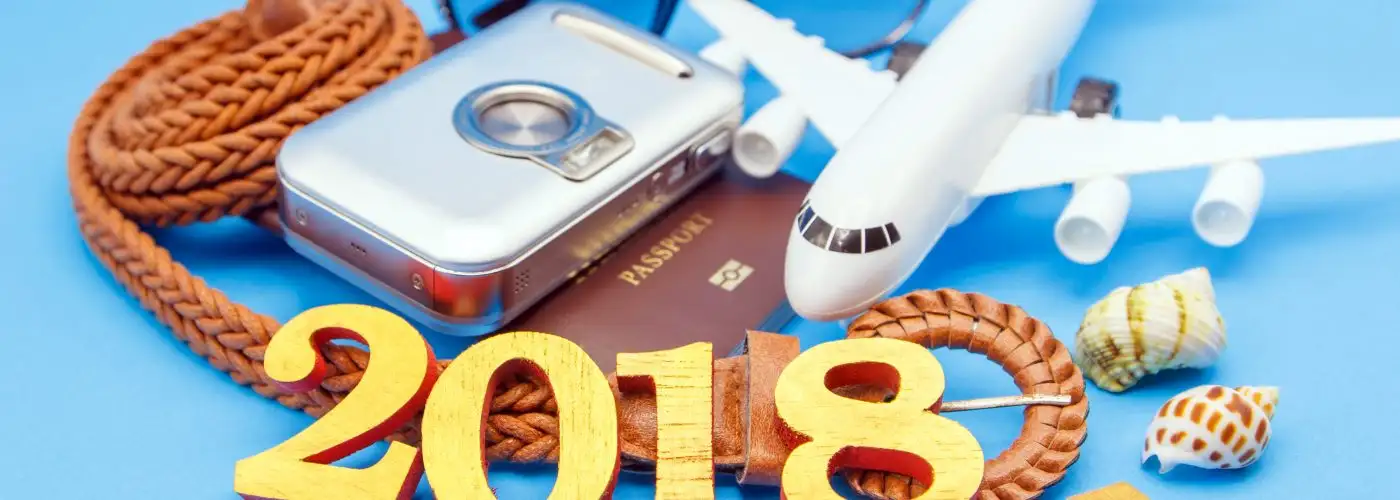The new year may be right around the corner, but to foresee what it might have in store for travelers, it’s useful to take a look back. Some 2017 travel industry changes were short-lived—remember the infamous laptop ban that had business travelers in a furor for a few months? But other trends from travel 2017 could have a more lasting effect.
Travel 2017: How Things Changed
Below are a few key trends that affected travelers in 2017—and could have ripple effects, good and bad, for years to come.
A Record-Breaking Hurricane Season
This year marked the first time in recorded history that three Category 4 hurricanes struck the United States. One of them, Hurricane Harvey, set tropical rainfall records as well. Hundreds of people were killed in the U.S., the Caribbean, and even Ireland (where Ophelia was the worst storm in recorded history).
While many affected destinations are already bouncing back, there will likely be lasting damage on some of the hardest-hit Caribbean islands, which could affect where travelers choose to go in 2018 and beyond. Even if next year’s hurricane season proves less active, travelers should learn one key lesson from travel 2017: If you’re planning a trip to the Caribbean or the Gulf Coast between June and November, you should always purchase travel insurance.
Earbuds That Translate in Real Time
Late in the year Google rolled out a revolutionary set of earbuds called Pixel Buds that are designed to translate other languages in real time. Reviews of the Pixel Buds have been mixed thus far, due to technical snafus and the limitations of Google Translate, which powers the translation function. (The app struggles with idioms in particular.) But the product gets travelers one step closer to the goal of being able to communicate with anyone, anywhere, in any language, and in real time.
Basic Economy Fares Put the Squeeze on Carry-Ons
This year United and American began selling basic economy fares that, among other restrictions, permit only a small personal item onboard. Traveling with anything other than a backpack or laptop bag? You’ll have to pay to check it.
Delta’s basic economy fares are slightly more generous, but the other two legacy carriers now have offerings that are in line with those of ultra-discount airlines like Spirit and Frontier, which balance out low fares with fees for just about everything. If you’re hoping to avoid being nickeled-and-dimed, you’ll have to be very careful about which fare category you book in 2018 and beyond.
Cuba Becomes Less Accessible for Americans
After President Obama loosened the restrictions on travel to Cuba in 2016, it seemed like the largest Caribbean island would be the new “it” destination for Americans, and U.S. airlines rushed to offer commercial flight service. But 2017 has tempered those expectations.
Many airlines have cut their services to Cuba due to less demand than expected, and a recent travel warning from the State Department has raised security concerns. The Trump administration has also tightened restrictions on how Americans can visit Cuba, requiring once again that most travelers come with an organized tour group and imposing a ban on doing business with many Cuban hotels.
Americans still have chances to visit Cuba, but after 2017 travel to the island will continue to be tricky.
More Compensation for Overbooked Flights
In April, a doctor was left injured and bleeding after being dragged off a United flight—and a video of the incident went viral. The ensuing firestorm featured heated debates over passenger rights and how much airlines should be willing to offer flyers who volunteer to get off an overbooked flight.
In the end United and Delta decided to authorize payouts of up to $10,000 for travelers who give up their seats, and Southwest elected to eliminate overbooking altogether. That’s good news for travelers: In fact, the number of overbooked travelers recently hit an all-time low. Here’s hoping that trend continues.
New Security Measures Are on the Way
In what may be a preview of coming attractions, both airlines and government agencies experimented with new security procedures throughout 2017. Travel to the U.S. from other countries may now involve short interviews and increased scrutiny on electronic devices, according to the Department of Homeland Security. This means you might want to allow a little extra time at the airport before any flight to the States.
Meanwhile, TSA is testing fingerprint screening and 3-D baggage scanners, both of which could help speed up security lines in the future. Not to be outdone, both Delta and JetBlue are experimenting with biometric boarding passes, with Delta using fingerprints and JetBlue using facial recognition. None of these high-tech changes has been rolled out on a grander scale—yet. But it seems only a matter of time.
More from SmarterTravel:
- 10 Insanely Affordable Winter Destinations for 2017/18
- Air Passenger Rights: The on-the-Go Guide
- Uber’s Flying Taxis Could Be Airborne by 2020
Follow Sarah Schlichter on Twitter @TravelEditor for more travel tips and inspiration.
We hand-pick everything we recommend and select items through testing and reviews. Some products are sent to us free of charge with no incentive to offer a favorable review. We offer our unbiased opinions and do not accept compensation to review products. All items are in stock and prices are accurate at the time of publication. If you buy something through our links, we may earn a commission.
Related
Top Fares From Wichita, KS
Today's Top Travel Deals
Brought to you by ShermansTravel
Shop and Save with Country Inns...
Patricia Magaña
 Hotel & Lodging Deals
Hotel & Lodging Deals
$229 -- Chicago: Discounted Rates and...
Francesca Miele
 Hotel & Lodging Deals
$229+
Hotel & Lodging Deals
$229+
$188 -- Honolulu: Save on Oceanview...
Abigail Lamay
 Hotel & Lodging Deals
$188+
Hotel & Lodging Deals
$188+




